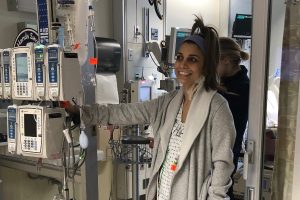A heart transplant survivor, ER doctor champions awareness
Alin Gragossian, DO, nearly died last December at the age of 30. An osteopathic physician in an emergency medicine residency program, she knew the signs of heart failure. Yet she mistook her own for common ailments.
Dr. Gragossian had always been active and healthy. When a cough continued for more than a month and she became easily winded, she attributed these changes to high levels of stress and a common cold. But after symptoms persisted beyond the two-month mark, she requested a chest X-ray. Her colleague encouraged her to stay the evening in the hospital. It was that decision that saved her life.
When she awoke days later, she learned her diagnosis was heart failure and she needed a heart transplant. Her condition was linked to a rare genetic anomaly her family now believes caused her grandfather’s early death from a heart attack.
It’s so important to know that symptoms of heart failure aren’t always dramatic.
As she recovers from a heart transplant, she is dedicating time to helping others understand their own risk for heart failure. She also wants to help demystify the process of organ donation.
“It’s so important to know that symptoms of heart failure aren’t always dramatic,” says Dr. Gragossian. “Learn more about your family health history and don’t wait to speak with your physician about recurring health issues, even if they seem minor.”
Changing hearts
According to the U.S. Department of Health and Human Services, 95 percent of U.S. adults support organ donation yet only 58 percent are signed up as donors. This difference in numbers is attributed to the myths that exist about donation.
One popular myth that prevents people from registering is the idea that if you agree to donate organs, the hospital staff won’t work as hard to save your life. Or similarly, you may not be dead when the death certificate is signed.
“Don’t worry. Doctors focus on saving the life in front of them—not a transplant recipient’s,” says Dr. Gragossian. “Please know that being an organ donor will never impact your quality of care. Also, you’re never too old, too young or too sick to register to save a life.”
By donating organs and tissue after death, one individual can improve as many as 75 lives.
By donating organs and tissue after death, one individual can improve as many as 75 lives.
Donor registration is simple, easy and important
The medical profession has made great advancements in transplant care, yet the need for organ donation continues to outpace the number of donors and transplants available.
As of January 2019, there were more than 113,000 candidates for transplant on the national waiting list. In 2018, there were 17,553 donors.
The process of becoming a donor is simple and straightforward. And if a donor changes their mind at any point, it is entirely possible to revoke the commitment, notes Dr. Gragossian.
Three steps to becoming an organ donor:
-
- Register with your state’s donor registry at organdonor.gov.
- Designate your choice on your driver’s license.
- Tell your family or caregiver.

